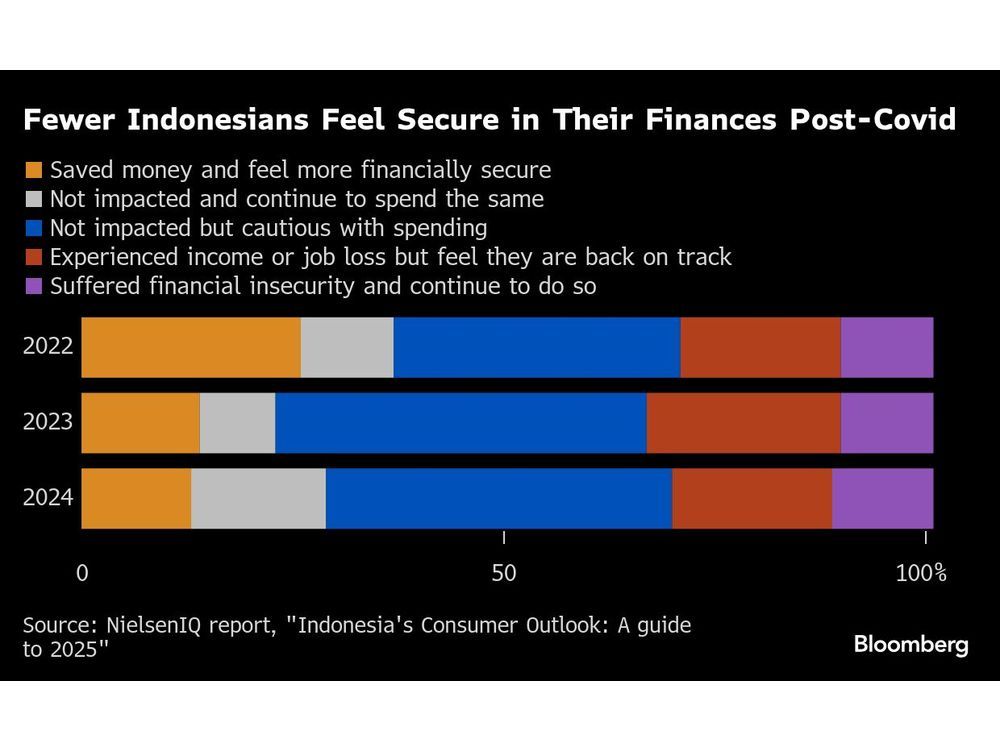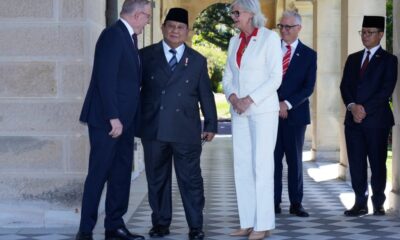Top Stories
Urgent Update: Indonesia’s Economic Growth Faces Consumer Skepticism

UPDATE: Indonesia’s economy is reportedly growing at its fastest pace in two years, yet consumer sentiment tells a different story. Recent data confirms that the nation’s growth surged to 5.12% in the second quarter of 2025, but many consumers remain hesitant, impacting businesses across the country.
Rohatta, a fried rice restaurant owner on the outskirts of Jakarta, reveals a troubling trend: his customer count has plunged from 150 to just 50-70 daily. “When they do come, they order fewer items. No drinks, no desserts,” he stated, as he struggles to maintain sales. To attract more customers, he has slashed prices by 20% and introduced lower-cost menu options.
As consumer behavior shifts, new terms have emerged to describe the frugal lifestyle: “Rojali” for hesitant mall-goers and “Rohana” for those who browse without buying. This growing trend of cautious spending is raising alarms within the government.
Coordinating Minister for Economic Affairs Airlangga Hartarto addressed these concerns during a briefing, insisting that “the issues of Rohana and Rojali are being blown out of proportion.” However, major retailers like PT Unilever Indonesia and PT Matahari Department Store reported shrinking sales, and even the instant noodle giant PT Indofood CBP Sukses Makmur only managed a modest 1.7% increase.
While mall foot traffic increased by 10% in the first half of this year, sales have not followed suit. “Shopping patterns have changed,” stated Alphonzus Widjaja, chairman of the Indonesia Shopping Center Association. “People only buy items with low prices because they have limited funds.”
This cautious spending extends to big-ticket items, with motorcycle sales down 2% and car sales plummeting by 8.5% in the first half of the year. Alarmingly, June saw car sales in Malaysia outpace those in Indonesia, despite Malaysia’s significantly smaller population.
The implications of this spending slump are major for Indonesia, a nation of over 280 million people reliant on high consumption rates for economic stability. President Prabowo Subianto faces increasing pressure to invigorate the economy as he prepares to unveil the 2026 state budget and deliver his first State of the Nation Address later this month.
Analysts are expressing skepticism about the reported growth. “The strength in household spending defies our observations,” said analysts from DBS Bank Ltd., who highlighted signs of underlying caution. Pantheon Macroeconomics economist Miguel Chanco echoed these concerns, stating, “What appears to be a spending slump is absolutely concerning.”
To counteract these trends, the government is rolling out its third stimulus package of the year, following a 1.5 billion USD aid initiative in June aimed at boosting salaries and providing social support. However, experts warn that these measures may have limited effectiveness.
Compounding these issues are falling commodity prices, high interest rates, and a reluctant banking sector, which are all hindering economic recovery. Job security remains a critical concern, as more than 42,000 workers were officially laid off in the first half of 2025, a staggering 32% increase from the previous year. Many newly created jobs are informal, leaving workers vulnerable and unable to rebuild savings depleted during the pandemic.
The reality is stark: nearly 10 million people have fallen out of the middle class since 2019, a group that is vital for driving consumption and tax revenue in Indonesia. “Underemployment is elevated,” said Krystal Tan from ANZ Group Holdings Ltd., emphasizing the cautious approach households are taking toward spending.
Farida, a Jakarta resident, reflects the sentiment of many: “We have a decent amount of savings now, but it still doesn’t feel enough.” As she and her husband cut back on non-essential expenses, they grapple with uncertainty about their financial future.
The urgent question remains: can Indonesia’s government effectively address these challenges and restore consumer confidence? As President Prabowo prepares to outline his vision for the country, all eyes will be on the upcoming announcements regarding economic strategies and initiatives aimed at fostering growth and stability.
-

 Politics4 weeks ago
Politics4 weeks agoSecwepemc First Nation Seeks Aboriginal Title Over Kamloops Area
-

 World5 months ago
World5 months agoScientists Unearth Ancient Antarctic Ice to Unlock Climate Secrets
-

 Entertainment5 months ago
Entertainment5 months agoTrump and McCormick to Announce $70 Billion Energy Investments
-

 Science5 months ago
Science5 months agoFour Astronauts Return to Earth After International Space Station Mission
-

 Lifestyle5 months ago
Lifestyle5 months agoTransLink Launches Food Truck Program to Boost Revenue in Vancouver
-

 Technology3 months ago
Technology3 months agoApple Notes Enhances Functionality with Markdown Support in macOS 26
-

 Lifestyle3 months ago
Lifestyle3 months agoManitoba’s Burger Champion Shines Again Amid Dining Innovations
-

 Top Stories2 months ago
Top Stories2 months agoUrgent Update: Fatal Crash on Highway 99 Claims Life of Pitt Meadows Man
-

 Politics4 months ago
Politics4 months agoUkrainian Tennis Star Elina Svitolina Faces Death Threats Online
-

 Sports5 months ago
Sports5 months agoSearch Underway for Missing Hunter Amid Hokkaido Bear Emergency
-

 Politics5 months ago
Politics5 months agoCarney Engages First Nations Leaders at Development Law Summit
-

 Technology5 months ago
Technology5 months agoFrosthaven Launches Early Access on July 31, 2025





















